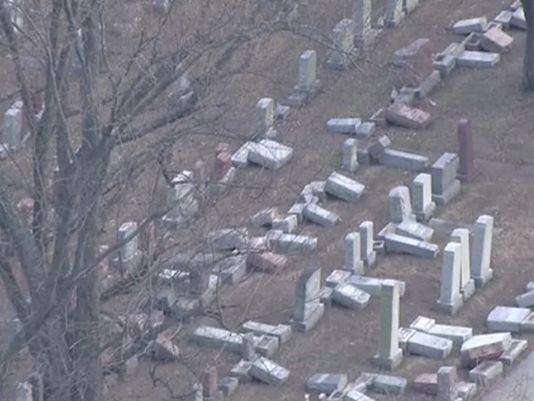In Judaism, what is more important — time or space?
In the early 1950s, Abraham Joshua Heschel realized that there are two main realms of holiness in Judaism: place (buildings and structures and land) and time (Shabbat and the festivals).
Heschel made it clear: he would choose time over place.
Judaism teaches us to be attached to holiness in time, to be attached to sacred events, to learn how to consecrate sanctuaries that emerge from the magnificent stream of a year. The Sabbaths are our great cathedrals; and our Holy of Holies is a shrine that neither the Romans nor the Germans were able to burn; a shrine that even apostasy cannot easily obliterate: the Day of Atonement.
And yet, over the past month, I have re-learned the lesson of the meaning of Jewish space.
There has been an unprecedented rise in the number of threats against Jewish institutions. Just several days ago, even the national headquarters of the ADL was threatened.
But, nothing feels worse than the desecration of the Jewish cemetery, Chesed Shel Emeth, in St. Louis, in which more than 170 gravestones were toppled.
This is hardly the first time.
- During pogroms in the nineteenth century, in the Russian Empire, Jew haters did not only attack Jewish homes and synagogues. They attacked Jewish cemeteries.
- On Kristallnacht, in 1938, Jew haters not only attacked Jewish homes, and synagogues, and businesses. They attacked Jewish cemeteries.
- Between 1948 and 1967, Jordan destroyed synagogues in the Old City of Jerusalem. On the Mount of Olives – the holiest Jewish cemetery in the world – Jordanians uprooted Jewish gravestones and allowed Pan Am to build the Intercontinental Hotel upon those graves. Which is why Pan Am has gone out of business. 🙂
- In 1990, in France, over the period of several days, more than 50 graves in two Jewish cemeteries in France were desecrated. In the cemetery at Carpentras, near Avignon in southern France, 34 tombs were badly damaged — and one body was exhumed and mutilated.
- In Vilna, the Lithuanian government had been planning on building a convention center on top of the old Jewish cemetery – the place where my family members are buried. An online petition gathered 38,000 signatures – and the government has put a stop to that project.
An attack on a Jewish cemetery is an attack on the Jewish people. It is an attack on Judaism. It is an attack on sacred memory. It is an attack on the bodies that are buried there.
It is a ghoulish attack on God.
Where, now, shall we find God in the events of the past few days – especially in the Jewish cemetery in St. Louis?
We find God in hakarat ha-tov – remembering the good that people do.
First, Vice President Mike Pence made a trip to St. Louis, and he personally helped in the cleanup of the cemetery.
Pence thanked residents for their efforts to restore the toppled headstones and said: “There is no place in America for hatred or acts of prejudice or violence or anti-Semitism.”
Perhaps this recent attack on Jewish memory will prove to be a reset button for this administration, and that if and when the need arises, responses will come more quickly, and they will come more vociferously.
Second, the American Muslim community.
In the wake of the attack on the cemetery in St. Louis, American Muslims started an online fundraiser, to raise money for repairs.
That campaign quickly surpassed its goals, and has now raised more than $100,000.
This, and this alone, might be responsible for the shifting of the narrative of Jews and Muslims in America.
Why did American Muslims help?
These are the words of Linda Sarsour, a Palestinian Muslim activist, who helped lead the clean up effort:
“This is what our faith teaches us to do.”
But, there is something more than that.
Linda Sarsour said that the Muslims have helped restore that Jewish cemetery because the Jews have been so supportive of the American Muslim community, in the face of right wing bigotry.
She has figured out what we all need to figure out — that, in America today, there is a confraternity of the hated — and that the Jews have been admitted into that grim club.
Now, it gets complicated.
Linda Sarsour has participated in anti-Israel activities.
Rabbi Sharon Brous writes:
In multi-faith and coalitional politics, we won’t agree on all issues all the time. Our nation is suffering from a soul crisis, rooted in a cynical politics that pits vulnerable populations against each other…It won’t always feel good to stand with folks who share some but not all of our priorities. But the only way to work effectively toward justice today is together…We just might find not only shared humanity but also shared purpose, even in people who hold perspectives that differ from our own.
I will walk with my moral allies as far as I can.
And, when I cannot walk with them, because I vociferously disagree with them, I will sit it out.
But, when those fragile moments are over, it should be possible for us to walk together again — to diminish the hatred that now threatens to smother this nation.
When Jews speak of the places where the dead reside, we do not speak of death. We call our cemeteries beit olam, a house of eternity, or a beit chayim, a place of life.
Perhaps out of this place of death, we might find new life: for our vision of America; of what it means to be Jewish; to reach out to others, and to be genuinely human.






